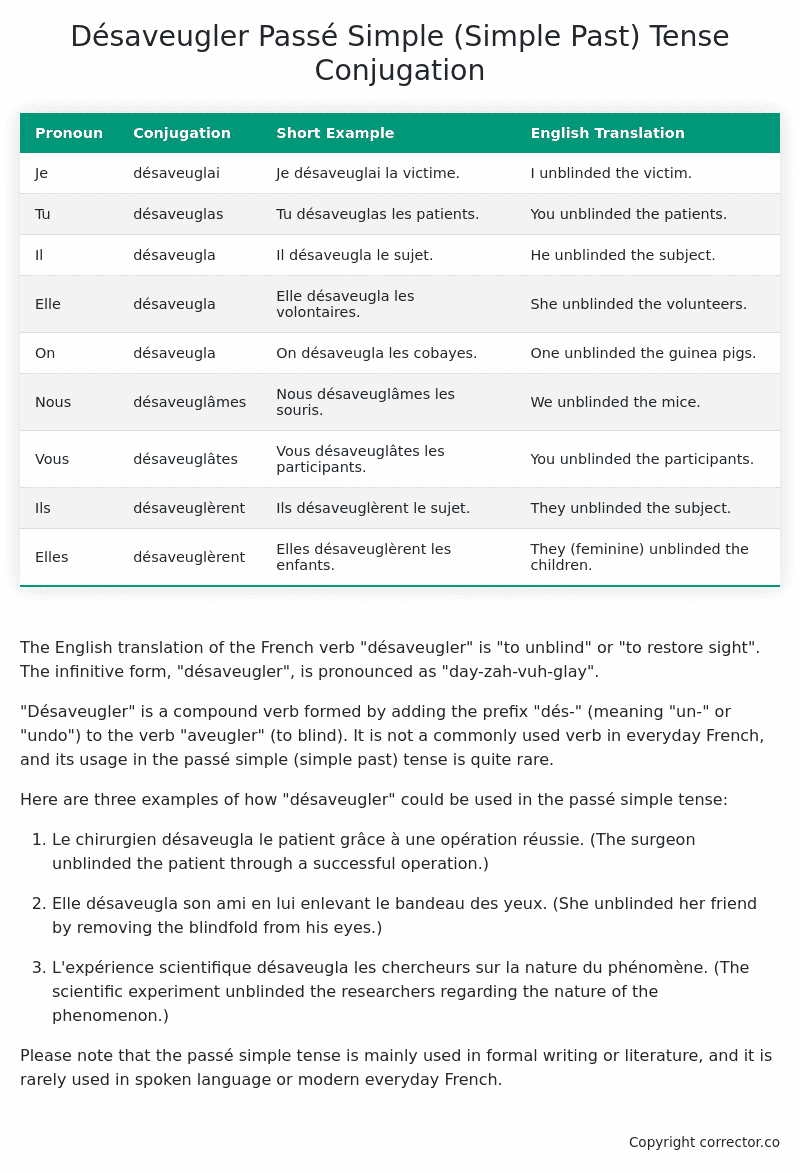Passé Simple (Simple Past) Tense Conjugation of the French Verb désaveugler
Introduction to the verb désaveugler
The English translation of the French verb “désaveugler” is “to unblind” or “to restore sight”. The infinitive form, “désaveugler”, is pronounced as “day-zah-vuh-glay”.
“Désaveugler” is a compound verb formed by adding the prefix “dés-” (meaning “un-” or “undo”) to the verb “aveugler” (to blind). It is not a commonly used verb in everyday French, and its usage in the passé simple (simple past) tense is quite rare.
Here are three examples of how “désaveugler” could be used in the passé simple tense:
-
Le chirurgien désaveugla le patient grâce à une opération réussie.
(The surgeon unblinded the patient through a successful operation.) -
Elle désaveugla son ami en lui enlevant le bandeau des yeux.
(She unblinded her friend by removing the blindfold from his eyes.) -
L’expérience scientifique désaveugla les chercheurs sur la nature du phénomène.
(The scientific experiment unblinded the researchers regarding the nature of the phenomenon.)
Please note that the passé simple tense is mainly used in formal writing or literature, and it is rarely used in spoken language or modern everyday French.
Table of the Passé Simple (Simple Past) Tense Conjugation of désaveugler
| Pronoun | Conjugation | Short Example | English Translation |
|---|---|---|---|
| Je | désaveuglai | Je désaveuglai la victime. | I unblinded the victim. |
| Tu | désaveuglas | Tu désaveuglas les patients. | You unblinded the patients. |
| Il | désaveugla | Il désaveugla le sujet. | He unblinded the subject. |
| Elle | désaveugla | Elle désaveugla les volontaires. | She unblinded the volunteers. |
| On | désaveugla | On désaveugla les cobayes. | One unblinded the guinea pigs. |
| Nous | désaveuglâmes | Nous désaveuglâmes les souris. | We unblinded the mice. |
| Vous | désaveuglâtes | Vous désaveuglâtes les participants. | You unblinded the participants. |
| Ils | désaveuglèrent | Ils désaveuglèrent le sujet. | They unblinded the subject. |
| Elles | désaveuglèrent | Elles désaveuglèrent les enfants. | They (feminine) unblinded the children. |
Other Conjugations for Désaveugler.
Le Present (Present Tense) Conjugation of the French Verb désaveugler
Imparfait (Imperfect) Tense Conjugation of the French Verb désaveugler
Passé Simple (Simple Past) Tense Conjugation of the French Verb désaveugler (You’re reading it right now!)
Passé Composé (Present Perfect) Tense Conjugation of the French Verb désaveugler
Futur Simple (Simple Future) Tense Conjugation of the French Verb désaveugler
Futur Proche (Near Future) Tense Conjugation of the French Verb désaveugler
Plus-que-parfait (Pluperfect) Tense Conjugation of the French Verb désaveugler
Passé Antérieur (Past Anterior) Tense Conjugation of the French Verb désaveugler
Futur Antérieur (Future Anterior) Tense Conjugation of the French Verb désaveugler
Subjonctif Présent (Subjunctive Present) Tense Conjugation of the French Verb désaveugler
Subjonctif Passé (Subjunctive Past) Tense Conjugation of the French Verb désaveugler
Subjonctif Imparfait (Subjunctive Imperfect) Tense Conjugation of the French Verb désaveugler
Conditionnel Présent (Conditional Present) Tense Conjugation of the French Verb désaveugler
Conditionnel Passé (Conditional Past) Tense Conjugation of the French Verb désaveugler
Conditionnel Passé II (Conditional Past II) Tense Conjugation of the French Verb désaveugler
L’impératif Présent (Imperative Present) Tense Conjugation of the French Verb désaveugler
L’impératif Passé (Imperative Past) Tense Conjugation of the French Verb désaveugler
L’infinitif Présent (Infinitive Present) Tense Conjugation of the French Verb désaveugler
L’infinitif Passé (Infinitive Past) Tense Conjugation of the French Verb désaveugler
Le Participe Présent (Present Participle) Tense Conjugation of the French Verb désaveugler
Le Participe Passé (Past Participle) Tense Conjugation of the French Verb désaveugler
Struggling with French verbs or the language in general? Why not use our free French Grammar Checker – no registration required!
Get a FREE Download Study Sheet of this Conjugation 🔥
Simply right click the image below, click “save image” and get your free reference for the désaveugler Passé Simple tense conjugation!

Désaveugler – About the French Passé Simple (Simple Past) Tense
Formation
Usage
Narration
Historical Context
Interactions with other tenses
Passé Composé
Imparfait
Conditional and Subjunctive
Summary
I hope you enjoyed this article on the verb désaveugler. Still in a learning mood? Check out another TOTALLY random French verb conjugation!


